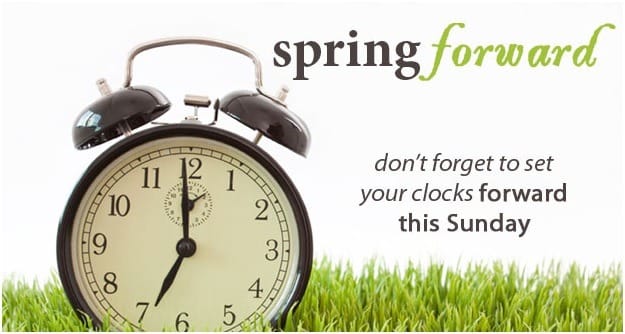
Drive Safe Tips for Daylight Savings Time
Here we go again – that time of the year where we adjust our clocks in hopes of maximizing daylight hours. The fall back is easier in that we gain an hour; however, the spring forward always carries with it the moans and groans of losing that hour.
On Sunday, March 12th at precisely 2am we spring forward into Daylight Savings Time (DST), and we lose that hour of sleep. It may be darker in the morning, but we make up for it as we gain that hour of daylight in the evening. Some do not even notice the difference, yet others will feel out of sorts for days afterwards.
Losing an hour of sleep is pretty tough on our bodies; it affects our moods, appetites and actually can make you a little more accident prone. The hardest hit are those on shift work or those who have irregular sleep patterns. Your body’s internal clock is pretty accustomed to routine, and although your brain knows that the time has changed, your body’s circadian rhythm needs time to adjust.

There are a few things you can do in order to prepare yourself for this hour loss; they may seem small and simple but know this, they could just save your life! There have been studies that show a rise in car accidents on the first workday after DST. From a recent article in The Globe and Mail:
“The loss of one hour’s sleep associated with the spring shift to daylight savings time increased the risk of accidents,” one study, published in the New England Journal of Medicine, concluded.
Here are a few tips to help you adjust to the change:
Start early
Reset one clock in your home back by one hour and then try and schedule your daily routine to that clock.
Go to bed earlier
This weekend, try heading to bed earlier – even if it is just by 15 minutes a night. This can make a big difference.
Control light and dark
In the morning, lighten up the place, open blinds and turn lights up. This will send a message to your body to wake. In the evening, do the opposite and most importantly, turn off the electronics, this will tell your body it is time to wind down.
Get outside and exercise
Not only is this good for you physically, getting that extra sunshine will increase your vitamin D levels – good for your body in so many ways, but important at this time of the year, it increases serotonin levels to help you keep smiling!
Don’t drive distracted
Of course this is important all year long – but even more so after Daylight Savings Time. If you feel the effects at all of losing that hour of sleep, you need all of your attention on the road during your morning commute. This means no coffee on the drive (save it for the office), eat your breakfast at home and put that cell phone away.
Check, replace, renew
Daylight Savings Time in the spring is also the time we should be checking those carbon monoxide detectors and smoke detectors to ensure they are in good working order. If you haven’t already, replace the batteries. This time of year is also a good time to check on your car insurance premiums. Are you getting the best rates available to you? Just like the time, Ontario car insurance rates change too.
Hopefully these suggestions will help you adjust more easily to this biannual time change.
Readmore:
You Might Want to Read
June 15, 2025
Sideswipe Collision: Who Is at Fault in Sideswipe Accidents?
June 15, 2025
Least Depreciating Cars in Canada
June 5, 2025
Welcome to the Team Keyes Insurance


